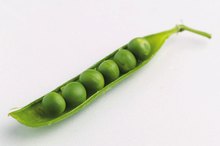Fiber Supplements That Make You Feel Full
Fiber is an indigestible type of carbohydrate that is not broken down like other carbs. Instead, it travels through your digestive tract, relatively intact, aiding in digestion and keeping you full. You should get enough fiber in your diet through fruits, vegetables and whole grains, but having inadequate intake may require a fiber supplement. If you take a fiber supplement, inform your physician as a precautionary measure.
Soluble vs. Insoluble Fiber
You need 25 to 38 g of soluble and insoluble fiber daily, reports the Mayo Clinic. In general, soluble fiber pulls water from your gut, creating a gel substance that slows digestion, allowing nutrients to fully absorb. Since this type of fiber slows digestion, it may help keep you full for hours after you eat. Insoluble fiber speeds up digestion, relieving constipation and keeping you regular. Most over-the-counter fiber supplements provide some type of soluble fiber, since it grinds into a fine powder, making it easy to chew or mix with a beverage. Insoluble fiber, including oat bran and wheat bran, come in a form that you can sprinkle on cereal or add to your baked goods recipe. Since insoluble fiber has a tough, rigid structure, it is not usually used in fiber supplements.
Psyllium
Side Effects of Pectin
Learn More
Psyllium is a type of soluble fiber that comes from the husks of psyllium seeds. This type of fiber supplement works by absorbing water in your gut and swelling. It helps form a soft bulky stool that is easy for you to pass. One study conducted by researchers at the Policlinico di Monza hospital in Italy and published in the "Journal of Clinical Gastroenterology" in 2010 evaluated the effects of psyllium fiber on satiety and weight loss. Researchers noted that soluble fiber, psyllium in particular, improves satiety, keeping you full, which benefits your weight loss efforts. Additionally, it can help stabilize blood sugar levels and lower blood cholesterol.
Methylcellulose
Methylcellulose is a synthetic form of soluble fiber that works in a similar manner as psyllium, absorbing water and expanding in your intestines, improving satiety. Methylcellulose promotes movement of your bowels, so ingesting large amounts at once may have adverse effects, such as diarrhea and abdominal cramping. This type of fiber supplement is often available as a powdery substance you can add to water, juice or coffee.
Inulin and Oligofructose
Which Is Best: Psyllium or Unprocessed Wheat Bran?
Learn More
Inulin is a natural type of soluble fiber found in non-starchy root vegetables, such as chicory root, garlic and onions. It has a sweet flavor, so you may see it as an ingredient in your breakfast cereal or fiber bar. A research review published in the "Critical Reviews in Food Science and Nutrition" in 2001 evaluated the effects of inulin and oligofructose as fiber supplements. These are similar substances, both are fructans that come from chicory root and have nearly identical effects in your gut. When inulin and oligofructose reach your colon, they ferment, increasing beneficial bacteria, as well as creating bulk. Since these types of fiber slow down your system, they can help keep you full when you include them in your diet.
Related Articles
References
- "Journal of Clinical Gastroenterology"; The Right Fiber for the Right Disease: An Update on the Psyllium Seed Husk and the Metabolic Syndrome; A. Giacosa and M. Rondanelli; September 2010
- MayoClinic.com; Dietary Fiber: Essential for a Healthy Diet; November 2009
- "Critical Reviews in Food Science and Nutrition"; Inulin and Oligofructose as Dietary Fiber: A Review of the Evidence; G. Flamm, et al.; July 2001
Writer Bio
Melodie Anne Coffman specializes in overall wellness, with particular interests in women's health and personal defense. She holds a master's degree in food science and human nutrition and is a certified instructor through the NRA. Coffman is pursuing her personal trainer certification in 2015.









